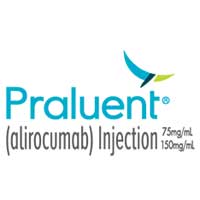Sanofi and Regeneron Pharmaceuticals, Inc. announced that the U.S. Food and Drug Administration (FDA) approved Praluent® (alirocumab) Injection, the first FDA-approved treatment in a new class of drugs known as PCSK9 (proprotein convertase subtilisin/kexin type 9) inhibitors.
Praluent is indicated as an adjunct to diet and maximally tolerated statin therapy for the treatment of adults with heterozygous familial hypercholesterolemia (HeFH) or clinical atherosclerotic cardiovascular disease (ASCVD), who require additional lowering of low-density lipoprotein (LDL) cholesterol.
HeFH is an inherited condition that causes high levels of low-density lipoprotein (LDL) cholesterol.
A high level of LDL cholesterol (known as “bad” cholesterol) in the blood is linked to cardiovascular disease.
Heart disease is the number one cause of death for Americans, both men and women.
According to the Centers for Disease Control and Prevention, about 610,000 people die of heart disease in the United States every year – that equals one in every four deaths.
“Praluent provides another treatment option for patients with HeFH or with known cardiovascular disease who have not been able to lower their LDL cholesterol enough on statins,” said John Jenkins, M.D., director of the Office of New Drugs, Center for Drug Evaluation and Research. “The FDA strongly supports continued work to provide new and innovative options for the treatment and prevention of cardiovascular disease.”
What is Praluent?
Praluent is an antibody that targets a specific protein, called PCSK9, which works by reducing the number of receptors on the liver that remove LDL cholesterol from the blood. By blocking PCSK9’s ability to work, more receptors are available to get rid of LDL cholesterol from the blood and, as a result, lower LDL cholesterol levels.
Praluent – clinical trial
The efficacy and safety of Praluent were evaluated in five placebo-controlled trials, involving 2,476 participants exposed to Praluent. All participants had HeFH or were otherwise at high risk for heart attack or stroke, and were taking maximally tolerated doses of a statin, with or without other lipid-modifying therapies. Participants taking Praluent had an average reduction in LDL cholesterol ranging from 36 to 59 percent, compared to placebo.
Multiple clinical trials have demonstrated that statins lower the risk of having a heart attack or stroke. A trial evaluating the effect of adding Praluent to statins on reducing cardiovascular risk is ongoing.
Important Safety Information about Praluent
The most common side effects of Praluent include itching, swelling, pain, or bruising where injection is given, nasopharyngitis, and flu. Allergic reactions, such as hypersensitivity vasculitis (a skin rash usually appearing as purple-colored spots on the skin associated with inflammation of small blood vessels) and hypersensitivity reactions requiring hospitalization, have been reported with the use of Praluent. Patients should stop using Praluent and get medical help if they experience symptoms of a serious allergic reaction.
Praluent is marketed by Sanofi-Aventis U.S., based in Bridgewater, New Jersey, and Regeneron Pharmaceuticals Inc., based in Tarrytown, New York.
Source: U.S. Food and Drug Administration, USA

